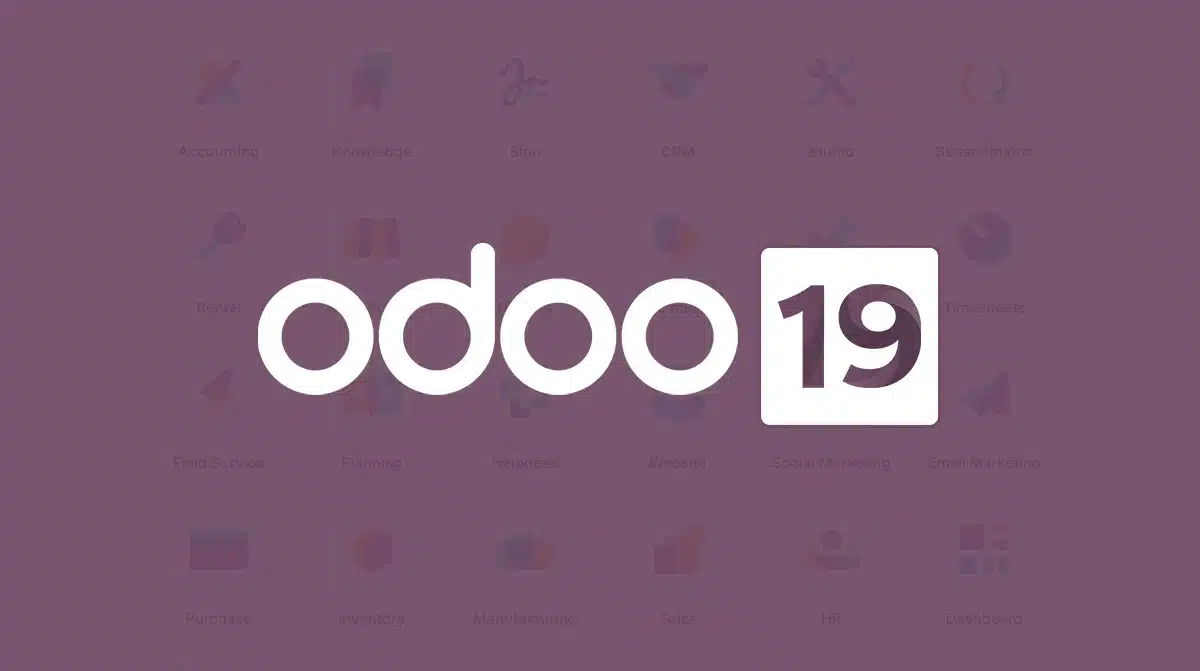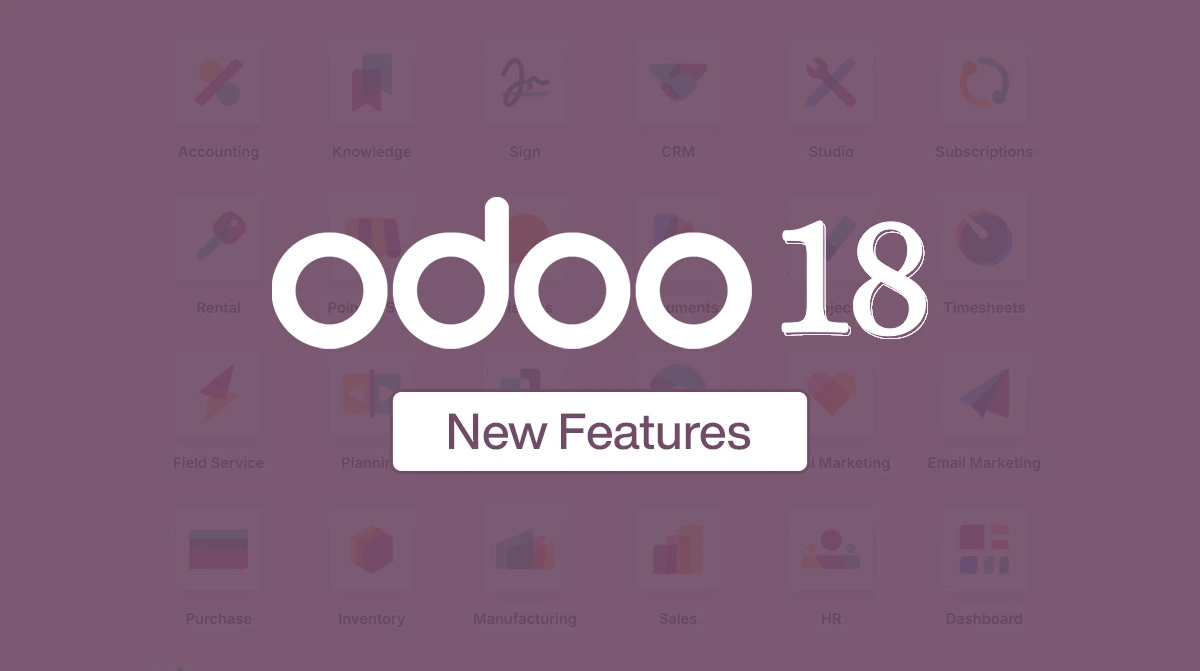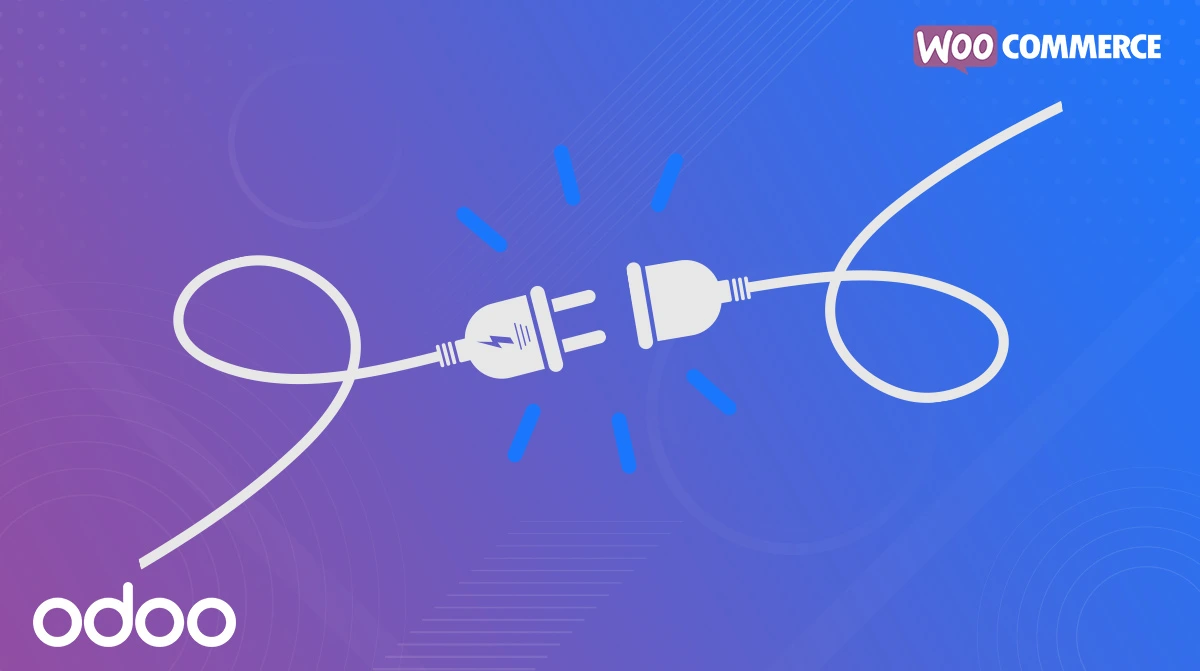Summary:
Logistics optimization is the backbone of modern supply chain management.
It simply refers to streamlining and fine-tuning processes to ensure goods move smoothly from point A to point B at a lower cost and delay but with high customer satisfaction. Today’s fast-paced world requires businesses to adapt to innovations to survive the currents in supply chains, which can impact an entire industry.
Enterprise Resource Planning (ERP) provides centralized platforms for handling and optimizing logistics processes.
Among the various available ERPs, Odoo ERP is a unique platform with versatile strengths in logistics optimization. Using integrated features with real-time capabilities, Odoo Logistics Management helps businesses with inventory control, transportation planning, and route optimization issues.
The Odoo transport and logistics module provides rich functionalities that simplify complex logistics operations. Many companies use this module to pursue operational excellence.
This paper will discuss how Odoo ERP can transform logistics management. We’ll explore:
- The importance of logistics optimization in supply chain management.
- Key features of Odoo logistics management that simplify operations.
- Benefits of using the Odoo transport and logistics module for real-time tracking and planning.
- How to implement Odoo ERP for logistics optimization effectively:
- Real-world examples demonstrating Odoo’s impact on efficiency in logistics.
At the end of this guide, you will understand how Odoo ERP can change your logistics processes and make your business thrive in the changing supply chain landscape.
The Challenges in Logistics Management

Logistics management requires precision, coordination, and a forward-thinking approach. However, even companies with the greatest experience handling logistics face recurring aches that restrict their efforts to be efficient and customer-satisfied. Now let’s look into some frequent problems and the reasons behind requiring live solutions:
- Inefficient Route Planning
Poorly designed delivery routes often result in time-wasting, expensive fuel consumption, and delays. Disruptions have set the supply chain back and left your customers unhappy. - Delayed Deliveries
Late deliveries can harm a company’s reputation and result in lost revenue. Traffic, bad scheduling, or last-minute order changes mainly contribute to this problem. - Inventory Mismanagement
Failure to maintain the right stock levels can lead to overstocking, understocking, or even product loss. This challenge shows the need for effective tools like Odoo for logistics companies to streamline inventory processes.

- Poor Communication Across Stakeholders
Miscommunication between the drivers, warehouse staff, and managers creates confusion and delays operations. A lack of transparency always creates operational delays and impacts smooth workflow and decision-making.
Real-time integrated solutions such as Odoo Warehouse Logistics are essential to solve these pain points. The advanced software platforms provide tools to optimize routes, manage inventory, and improve stakeholder communication to ensure a seamless logistics process.
Read More – How Odoo ERP is Transforming Manufacturing Operations Today
Overview of Odoo ERP Solutions
Odoo ERP is a complete and flexible enterprise resource planning software that manages virtually all aspects of a company, including accounting, sales, and human resources.
Another distinctive feature of Odoo is its modular structure, which allows businesses to pick modules according to their requirements and integrate them seamlessly. Thus, companies can scale usage up or down with their growth, fitting the solution to their precise needs.
Key Features of Odoo ERP:
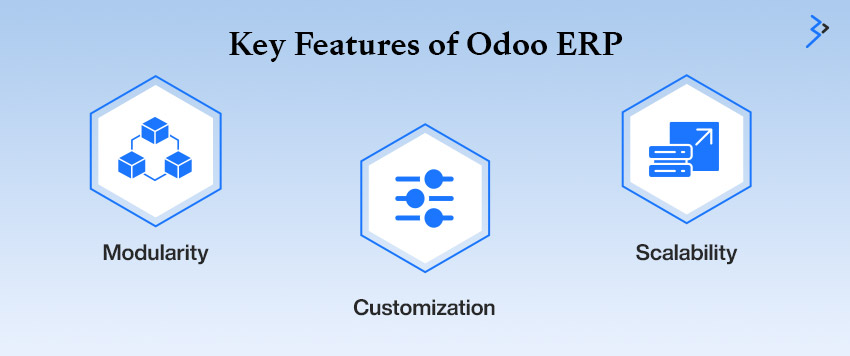
- Modularity: The system has various applications, ranging from CRM development services to sales, inventory, and manufacturing. One of its most important selling points is that it can add or remove modules according to needs.
- Customization: Odoo has an extended capability for customization, where a business can modify the software according to its unique processes and needs.
- Scalability: Whether for a small business or an enterprise, Odoo can grow with the organization, providing stable solutions regardless of size.
Odoo for Logistics Companies
Odoo’s ERP is very popular in logistics and supply chain management. The application provides an integrated toolset for warehousing, inventory, procurement, and shipping. With Odoo for Logistics, companies can streamline processes, track goods in real-time, and optimize routes.
ERP for Logistics
Odoo seamlessly integrates all the functions of logistics and supply chains, which means it is an ideal choice for logistics companies. Managing shipment, stock, and order flow reduces inefficiencies in various businesses. Its built-in logistics and supply chain features make it the first and best choice for optimizing the business operations of companies interested in the field.
Real-Time Logistics Optimization Features in Odoo
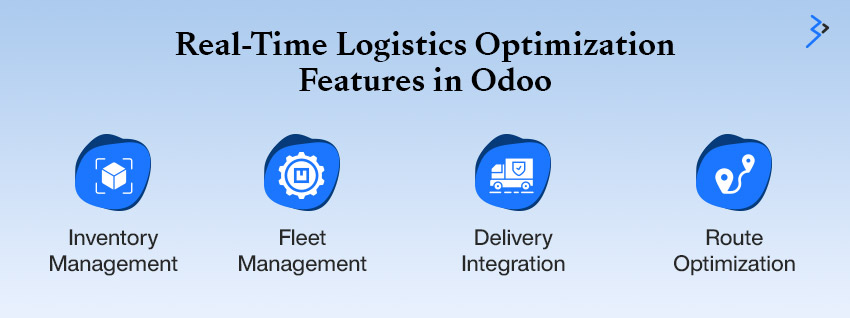
Odoo possesses a robust suite of features capable of optimizing logistics in real time, making it a great value to the logistics industry as an ERP solution. Its seamless integration across modules makes Odoo enable efficiency, reduce operational costs, and improve customer satisfaction.
1. Inventory Management
Odoo’s module for managing inventory has current stock-level tracking to handle warehouse management efficiently for most businesses. It is particularly useful for businesses that utilize off-site self-storage solutions, as it minimizes overstocking and prevents stockouts, enabling more informed decisions for reduced supply storage costs. Automating stock replenishment ensures that goods circulation in the supply chain is enhanced.
2. Fleet Management
Fleet management Odoo introduces efficiency in fleet vehicle operations. With real-time monitoring of the locations of all vehicle assets, there are timely indicators of the next vehicle’s maintenance schedule. All of the above results in maintaining and keeping vehicles with little downtime and fewer high-cost repairs. The key performance of fleet operations in fuel consumption allows operational expenditures to decrease while utilization increases.
3. Delivery Integration
Odoo integrates with major carriers such as UPS, FedEx, and DHL, allowing businesses to track shipments in real-time easily. This integration provides automatic updates on the status of deliveries, improving communication with customers and reducing the need for manual tracking. It helps logistics companies manage and streamline their delivery processes, ensuring timely deliveries and higher customer satisfaction.
4. Route Optimization
Odoo’s automated route planning feature helps businesses choose efficient delivery routes, conserving time and fuel utilization. It considers factors such as traffic, distances, and delivery time windows to bring out optimized routes, thus completing deliveries more quickly and cost-effectively in terms of transportation.
Read More – Odoo ERP in Action: Solving Insurance Industry Challenges
Benefits of Using Odoo for Logistics Optimization
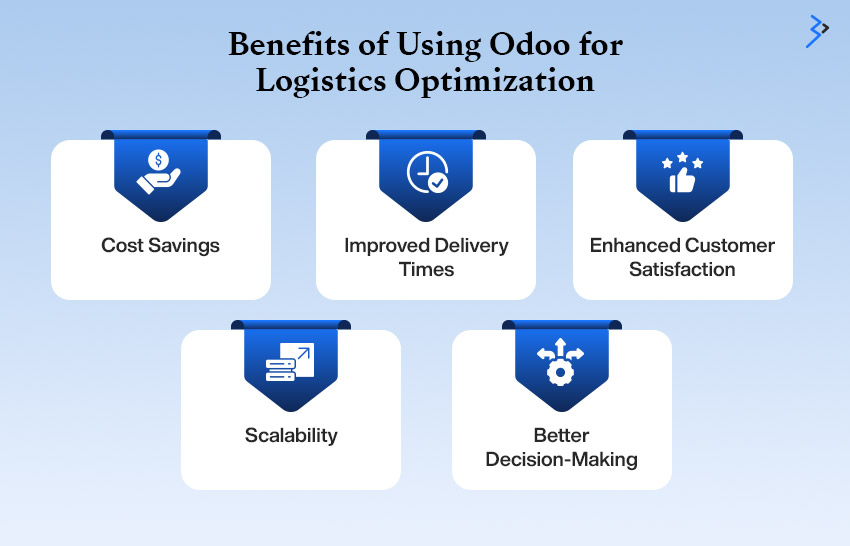
Odoo simplifies and streamlines every logistics process. With many robust features, particularly inside Odoo Supply Chain Management, it offers businesses key benefits in improving efficiency and, eventually, customer satisfaction. Let’s break down its key benefits:
1. Cost Savings
- One of the main advantages of the Odoo Supply Chain is cost reduction.
- Automation helps eliminate the need for manual intervention in routine jobs such as updating inventory and order processing.
- Real-time monitoring and updates will eliminate delays and reduce operations errors and overhead costs.
2. Improved Delivery Times
- Odoo enhances delivery performance by optimizing workflows, from order placement to delivery.
- Features like automated route planning and live updates ensure faster and more reliable deliveries.
- This reduces delays and helps businesses meet customer expectations consistently.
3. Enhanced Customer Satisfaction
- This proactive visibility helps businesses reduce WISMO tickets by providing customers with instant access to shipment status and delivery updates.
- Timely updates and accurate delivery windows improve customer trust and satisfaction.
- Its user-friendly interface ensures customers and businesses alike benefit from smooth communication and transparency.
4. Scalability
- The modular structure of Odoo is perfect for businesses that aim to grow.
- Whether the operation is small or large, Odoo Supply Chain Management fits changing needs.
- You can scale up by adding new functionalities, such as fleet management or advanced analytics, without disrupting current operations.
5. Better Decision-Making
- Data-driven insights are a remarkable feature of Odoo.
- It provides business organizations with key logistics metrics reports and analytics to enable strategic business decisions.
- With this visibility, a company can identify bottlenecks, optimize resource utilization, and plan for the future.
Read More – Modern Restaurant Management Made Simple with Odoo ERP
Implementing Odoo ERP for Logistics Optimization
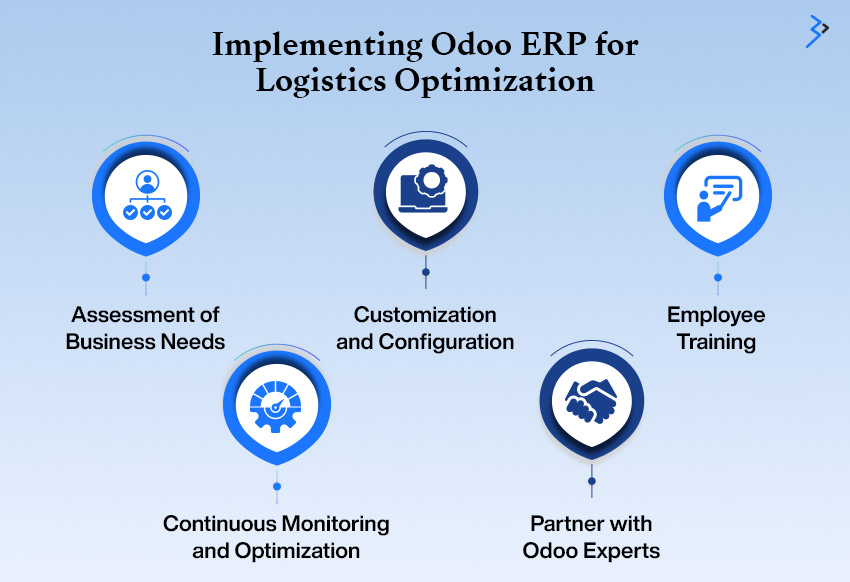
Odoo ERP has revolutionized the operations of any business trying to manage its logistics and supply chain processes smoothly. To execute Odoo for logistics smoothly, proper implementation is required. Here’s how:
1. Assessment of Business Needs
You have to evaluate your current logistics operations in detail. Then, you have to establish the pain points, where efficiency should improve, and, thereby, how things ought to get faster-delivery improvements or better inventory tracking- which are their goals. This step ensures proper implementation according to your specific requirement for supply chain management in Odoo.
2. Customization and Configuration
Odoo is highly versatile, offering modules that cater to various logistics needs. Customization is key—tailor modules like Odoo CRM Supply Chain, inventory, and fleet management to fit your business workflows. Proper configuration ensures that the ERP system integrates seamlessly with your existing processes.
3. Employee Training
A new ERP system requires adoption by the logistics team. Conduct comprehensive training sessions to familiarize employees with the system’s features. This ensures smooth day-to-day operations and reduces errors during the transition phase.
4. Continuous Monitoring and Optimization
Even after implementation, regular monitoring is crucial. Keep an eye on system performance, identify areas for improvement, and apply updates or fine-tuning to achieve long-term efficiency in logistics and supply chain management using Odoo.
Partner with Odoo Experts
Working with experienced Odoo experts is important to make the integration process seamless. They bring the technical knowledge required to address challenges and ensure the system delivers maximum value to your logistics operations.
Future of Real-Time Logistics with Odoo
With the ever-evolving logistics landscape, new technologies like AI and IoT revolutionize how businesses run their operations. Tools like Odoo Supply Chain software have become necessary to support companies that need to excel in an environment where everyone is clamoring for precision, efficiency, and visibility.
Emerging Trends in Logistics Optimization
- AI-driven predictive Analytics: It allows companies to foresee demand and optimize delivery routes to prevent delays and make better decisions.
- IoT for Real-Time Tracking: IoT devices enable real-time visibility of shipments, fleets, and warehouse operations.
Read More – Top 10 Open Source ERP and CRM Systems
Odoo’s Role in the Future of Logistics
- Ease of Integration with Advanced Technologies: Supply Chain Management Odoo ensures businesses can easily integrate AI and IoT tools for an integrated logistics platform. This integration facilitates predictive analytics, automated inventory updates, and real-time shipment tracking.
- Automation of core processes: Odoo modules streamline various workflows, such as warehouse management and order fulfillment, reducing errors and accelerating the process.
Real-Time Logistics with ERP Systems Like Odoo
As ERP systems like Odoo lead the charge, the future of logistics will likely be defined by:
- Hyper-connected supply chains driven by data insights.
- Proactive problem-solving through real-time alerts.
- Improved customer satisfaction by offering faster and clearer delivery processes.
With its adaptability to emerging technologies, Odoo will redefine logistics, making supply chains more efficient, resilient, and future-ready.
Related Articles
-
Meet Odoo 19: Ushering in the Next Era of Enterprise Excellence
The pace of digital transformation is reshaping the very foundation of ERP systems. Today’s enterprises demand platforms that drive scalability, enhance agility, and deliver seamless user experiences across operations. In
-
Odoo 18 Highlights: Everything You Need to Know!
Odoo has always been a significant player in ERP (Enterprise Resource Planning) solutions, providing businesses a platform to manage their operations more effectively. With its Odoo 18 release, the ERP
-
The Ultimate Guide to Odoo Connectors for Seamless Integration
Odoo is a free and open-source enterprise resource planning (ERP) system with a modular architecture and several business apps. These apps include eCommerce, customer relationship management (CRM), accounting, manufacturing, and


